This is the latest trailer for new version of The Incredible Hulk, which opens next month:
> Official site for The Incredible Hulk
> Edward Norton’s response to the bad buzz about the film
Editor of FILMdetail
This is the latest trailer for new version of The Incredible Hulk, which opens next month:
> Official site for The Incredible Hulk
> Edward Norton’s response to the bad buzz about the film
Someone has created a very slick viral video that reimagines the Democratic presidential primary as The Empire Strikes Back.
> Find out more about the 2008 Democratic presidential primary at Wikipedia
> The Empire Strikes Back at the IMDb
UPDATE: It looks like it was created by a YouTube user called Humanitainment.
 I’ve just realised that YouTube is down.
I’ve just realised that YouTube is down.
Server problems? Or perhaps the Pakistan government somehow taking it offline again, like they did back in February?
Paul Glazowski at Mashable has some thoughts:
First highlighted by Allen Stern at CenterNetworks, the outage seems to have stretched the globe, with reports from people spanning the US, the UK, Estonia, and places elsewhere.
A few simple requests by yours truly for YouTube clips via Google Search this morning return links to unresponsive pages. (The Australian site is down too, by the way.)
Not good, not good. Maintenance gone wrong, is it? Who’s to say? Google’s not talking, neither on the company blog or, more specifically, on the official Youtube Blog.
UPDATE at 15.15 GMT: It is back up in the UK.
What about where you are in the rest of the world? Leave any comments below.
May 1st was RSS Awareness Day, so I’m coming to this a couple of days late, but given that only 5.4% of the Internet uses RSS it is worth plugging this video that explains why it is the best way to read websites:
In future, how about an RSS Awareness week?
> RSS Awareness Day
> Try out an RSS reader like Google Reader or Netvibes
> Find out more about RSS at Wikipedia
Christine Lord is the mother of Andrew, a former colleague of mine who died last year of variant CJD.
She recently featured in an edition of the BBC current affairs program Inside Out which explored her battle to find out why her son died such a tragic and unnecessary death.
You can watch it on BBC’s iPlayer here or by clicking the image below:
As someone who knew and worked with Andy over a 2 year period, a lot of this programme was deeply upsetting.
Like many others who worked with him at Talk Radio and TalkSPORT I can testify that he was a genuinely lovely guy and a real pleasure to be around.
Christine has a website called Justice for Andy which you can visit here and has also written a piece for the Inside Out site here.
N.B. As with all iPlayer shows it will only be available for a few days and to UK viewers only. Although if anyone at the BBC is reading this, is there any chance of putting it up permanently on your YouTube channel?
UPDATE 07/07/08: You can now watch the programme by clicking on this link
> iPlayer link to the programme
> Christine’s piece for the BBC Inside Out website
> Justice For Andy site
This week we review Iron Man and Joy Division.
Listen to the reviews here:
[audio:https://www.filmdetail.com/podcast/get.php?fla=podcast-2008-05-02-88068.mp3]Download and subscribe to the review podcast via iTunes by clicking here.
> Download this review podcast as an MP3 file
> Get local show times for your area via Google Movies
> Check out other reviews for these films at Metacritic
Come to think of it, Bill Gates does sound a little like Kermit the Frog:
[Link via Macenstein]
College Humour have done an edit of Tim Burton’s 1989 Batman film cut alongside the trailer for the upcoming The Dark Knight.
Notice the similarities:
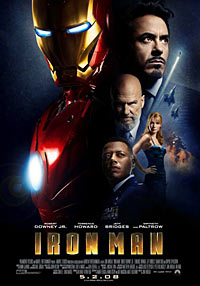 I saw Iron Man last night and I’d be very surprised if it doesn’t open really big this weekend.
I saw Iron Man last night and I’d be very surprised if it doesn’t open really big this weekend.
If you aren’t familiar with the character, it is one of the few remaining Marvel heroes who hasn’t made it to the big screen in the last decade.
Tony Stark (Robert Downey Jnr) is a billionaire industrialist and genius inventor who is kidnapped in Afghanistan, where he builds a high-tech suit of armor to escape.
When he returns to the US he decides to change his cynical arms-dealing ways and protect the world as Iron Man.
Various elements of the film click into place:
There are a couple of elements that don’t quite come off, notably the climax which is a little too standard given what has gone before it, but overall this is slick and smart summer blockbuster.
Given the effective marketing campaign and quality of the finished film I would be suprised if this didn’t open to about $80 million in the US this weekend.
Some are predicting it could be as high as $100 million, but it would have to do extremely well to reach that figure over the 3 day weekend.
That said, tracking and awareness for this film is reportedly huge and I think word of mouth from those who see it on the Thursday preview screenings and Friday night showings will convince others to check it out.
One major fly in the ointment for Paramount and Marvel is the release today of Grand Theft Auto 4 – which is set to be one of the biggest selling computer games of all time.
The big worry for Iron Man’s box office is that the key demographic for the film (young males) will be at home on their consoles all weekend.
It is clearly a concern – and may lead to studios watching computer game release schedules more closely in future – but I actually think that demo is going to want to see Iron Man as well.
There is also a hi-tech cool factor to the film that should play well to both a computer savvy audience and the wider public.
Geeks may note that Stark multi-tasks on Dell and Apple workstations when creating his suit, although the operating system is one of those magical movie creations that does anything it is asked of.
Less tech-savvy audience members are still going to like the action, SFX and his funny robot assistants.
Whatever happens, Marvel and Paramount should have a huge franchise on their hands.
> Official site for Iron Man
> Reviews for Iron Man at Metacritic
> Find out more about the Iron Man character at Wikipedia
> /Film and Deadline Hollywood Daily on whether or not Grand Theft Auto 4 will affect Iron Man’s box office
> Anne Thompson interviews Jon Favreau about the film in Variety
Joy Division is the new documentary about the Manchester band behind such seminal albums as Unknown Pleasures and Closer.
Formed in 1976 they consisted of Ian Curtis (vocals), Bernard Sumner (guitar and keyboards), Peter Hook (bass guitar and backing vocals) and Stephen Morris (drums and percussion).
They remain one of the most enduring bands of the last 30 years and although their career was cut short by the tragic death of Curtis in 1980, the remaining members went on to form New Order.
Directed by Grant Gee, the documentary features interviews with all the surviving band members and explores the band’s history through never-before-seen live performance footage, personal photos, period films and newly discovered audio.
It also features contributions from the late Factory Records owner Tony Wilson, iconic Factory Records graphic artist Peter Saville, photographer/filmmaker Anton Corbijn, Belgian journalist Annik Honoré (speaking for the first time about her relationship with Ian Curtis) and many other connected with the band.
I recently spoke with the drummer Stephen Morris about the film, how it differs from Control (the biopic that came out last year) and the legacy of the band.
Listen to the interview here:
[audio:http://filmdetail.receptionmedia.com/Stephen_Morris_on_Joy_Division.MP3]Download it as a podcast via iTunes by clicking here.
Joy Division opens at selected UK cinemas on Friday 2nd May
Check out the trailer here:
> Download this interview as an MP3
> Official site for the Joy Division film
> Find out more about Joy Division at Wikipedia
[Image courtesy of The Works / © Paul Slattery / Retna Ltd.]
This week we review Forgetting Sarah Marshall, Stop-Loss, The Eye and Persepolis.
Listen to the review podcast here:
[audio:https://www.filmdetail.com/podcast/get.php?fla=podcast-2008-04-25-75207.MP3]Download and subscribe to the review podcast via iTunes by clicking here.
> Download this review podcast as an MP3 file
> Get local show times for your area via Google Movies
> Check out other reviews for these films at Metacritic
A classic scene from Raging Bull cut to The Flintstones:
[Warning: The fruity language may not be suitable for the workplace]
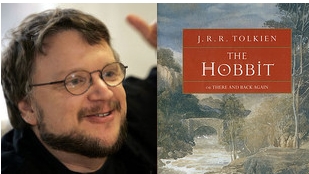 It is now official – Guillermo Del Toro will direct The Hobbit as two films shot back-to-back.
It is now official – Guillermo Del Toro will direct The Hobbit as two films shot back-to-back.
Dave McNary of Variety reports:
In a major step forward on “The Hobbit,” Guillermo del Toro has signed on to direct the New Line-MGM tentpole and its sequel.
The widely expected announcement — which had been rumored for several weeks — came Thursday afternoon jointly from exec producers Peter Jackson and Fran Walsh, New Line president Toby Emmerich, and Mary Parent, newly named chief of MGM’s Worldwide Motion Picture Group.
Del Toro’s moving to New Zealand for the next four years to work with Jackson and his Wingnut and Weta production teams.
He’ll direct the two films back to back, with the sequel dealing with the 60-year period between “The Hobbit” and “The Fellowship of the Ring,” the first of the “Lord of the Rings” trilogy.
New Line is overseeing development and will manage production. Both pics are being co-produced and co-financed by New Line Cinema and MGM, with Warner Bros. distributing domestically and MGM handling international.
There isn’t a script yet but it seems likely that Peter Jackson, Walsh and Philippa Boyens will collaborate with Del Toro.
With the Mexican director of Cronos, Hellboy and Pan’s Labyrinth on board for the next four years, it seems that the two movies will be shot back-to-back next year and released in late 2011 and 2012.
The WETA production facilities – built for The Lord of the Rings trilogy – will be used for both films, and New Zealand will once more stand in for Middle-earth.
For those not familair with the book, the story of The Hobbit pre-dates the Rings trilogy and concerns Bilbo Baggins taking the Ring of Power from Gollum.
> Full story at Variety
> Find out more about Guillermo Del Toro at Wikipedia
Someone has made a 10 minute compilation of every single death in The Sopranos:
It goes without saying that there are spoilers and violence.
[Link via LinkMachineGo]
> HBO page for The Sopranos
> Episode guide and timeline for the show at Wikipedia
Since coming to fame with the lead role in the TV series Dark Angel, Jessica Alba has appeared in films such as Sin City, Fantastic Four and Into the Blue.
Her latest is The Eye, a US remake of the 2002 Asian horror film about a young blind woman who experiences mysterious visions after a cornea transplant.
I spoke to Jessica recently in London where we discussed the film and her recent role in hosting the ‘technical Oscars‘ (a.k.a the Academy of Motion Picture Arts and Sciences’ Scientific and Technical Awards).
Listen to the interview here:
[audio:http://filmdetail.receptionmedia.com/Jessica_Alba_on_The_Eye.MP3]Download it as a podcast via iTunes by clicking here.
The Eye is out now at UK cinemas
> Download this interview as an MP3
> Jessica Alba at the IMDb
> Official UK site for The Eye
[Image courtesy of Lionsgate UK © 2008]
Photos of Woody Allen’s latest film (as yet untitled) surfaced over at Just Jared recently.
They show Larry David and Evan Rachel Wood walking around Manhattan’s Lower East Side, in what would appear to be a riff on the familiar Allen theme of a young woman dating an older guy.
However, check out the poster to the left of them in this picture:
It is for Tom McCarthy‘s new film The Visitor – which we wrote about on Tuesday.
As Jeffrey Wells has pointed out, this is the second time in recent years that Allen has plugged another film in the background of one of his – there was a shot of The Motorcyle Diaries showing at the Curzon Mayfair in a scene in Match Point.
[Link via Hollywood Elsewhere]
> IMDb page for the Unitled Woody Allen Project
> Our first thoughts on The Visitor
This year’s Cannes Film Festival lineup has been announced.
The films in official competition are:
The big films showing out of competition are:
Variety have a comprehensive list of all the films showing here.
> Official site for the festival
> A Guide to the Cannes film festival from last year
US comedian and talkshow host Bill Maher has a new documentary about religion coming out later this year called Religulous.
His recent monologue about Catholicism on his HBO show Real Time has recently been causing some debate in the US:
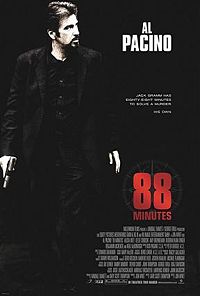 I remember last year seeing a poster in Cannes for 88 Mins – the Al Pacino thriller that has just opened in the US to universally awful reviews.
I remember last year seeing a poster in Cannes for 88 Mins – the Al Pacino thriller that has just opened in the US to universally awful reviews.
At the time I assumed it was one of the many promotional posters that adorn the Croisette during the festival, but it was actually one for the local cinema.
I remember thinking ‘why hasn’t it opened in the US or UK’ yet? The answer would appear to be that this was some kind of crazily financed vanity project that went horribly wrong.
Todd McCarthy of Variety points to some of the film’s glaring flaws:
88 Minutes can’t even live up to its title. With 19 — count ’em, 19 — producers, including director Jon Avnet, ensuring that every aspect of the film, from the script to the star’s haircut, is ludicrous in the extreme, the picture easily snatches from “Revolution” the prize as Al Pacino’s career worst.
Available on DVD in some territories as early as February 2007 and rolled out theatrically in France and elsewhere beginning in May of last year, this gape-inducing fiasco is getting a token domestic release that at least saves its star the indignity of a dump straight to homevid.
The presence of 19 producers is just one of the telling signs something was wrong in Pacinoville.
As the dodgy opening credits begin you know things are only going to get worse. And they do – with a vengeance.
The lowlights include:
Check out the other reviews here at Metacritic.
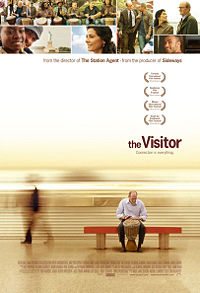 Tom McCarthy made one of the best films of 2003 with The Station Agent and his latest The Visitor is just as good.
Tom McCarthy made one of the best films of 2003 with The Station Agent and his latest The Visitor is just as good.
The story involves a college professor (Richard Jenkins) who finds a young immigrant couple living in his New York apartment.
It then follows the characters as they connect with one another in unexpected ways.
Like his previous work, it is thoughtful, beautifully observed and features rounded characters who feel like people you might actually meet in real life.
Jenkins is a character actor you might recognise – he’s probably best known for his fine work as Nathaniel Fisher in Six Feet Under or as the FBI agent in Flirting with Disaster.
Here he is finally given a lead role that allows him demonstrate his considerable acting skills and there is fine support too from Haaz Sleiman, Danai Jekesai Gurira and Hiam Abbass.
But what really makes this film stand out is the way it manages to tackle some really big themes with such intelligence and grace.
Immigration, loss and love are just a few of the issues dealt with here, but it never feels like a stodgy parable.
Instead, it manages to take us deep into the hearts and minds of people caught up in the chilly climate of a post-9/11 world.
It is one of those rare films that manages to engage your heart and brain, but does so with the subtle skill of a richly gifted director.
Check out the trailer here:
The Visitor is currently on limited release in the US and opens in the UK on July 4th
> Official site for The Visitor
> IMDb page
> Check out reviews of the film at Metacritic
[ad]
This trailer mashup of Jaws as a cheesy family movie has been around for a while but I never got around to posting it before.
It was created by Mike Dow & Ari Eisner (Smacky Productions)
I saw Forgetting Sarah Marshall yesterday and whilst it isn’t quite as funny as Superbad, it is still a solid comedy with a lot of laughs.
It certainly signals redemption for Team Apatow after the misfire of Drillbit Taylor and although it probably won’t top the US box office this weekend, it should have legs. It is that rare kind of comedy that should score solid word of mouth amongst young male and female audiences.
The plot is about a guy (Jason Segel) who travels to Hawaii after his famous actress girlfriend (Kristen Bell) dumps him for a British rocker (Russell Brand), only to find they are there too.
The cast have done this video detailing their own break up stories:
This week we review In Bruges and Happy-Go-Lucky.
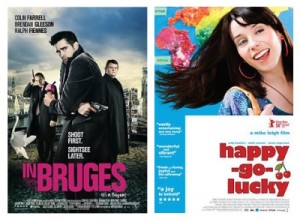
Listen to the review podcast here:
[audio:https://www.filmdetail.com/podcast/get.php?fla=podcast-2008-04-18-20310.MP3]Download and subscribe to the review podcast via iTunes by clicking here.
> Download this review podcast as an MP3 file
> Get local show times for your area via Google Movies
> Check out other reviews for these films at Metacritic
 Steven Spielberg and George Lucas recently sat down with EW’s Steve Daly to discuss the upcoming Indiana Jones movie and the impact of the internet on how films are made and released.
Steven Spielberg and George Lucas recently sat down with EW’s Steve Daly to discuss the upcoming Indiana Jones movie and the impact of the internet on how films are made and released.
Some notable quotes include them disagreeing on internet speculation:
STEVEN SPIELBERG: It really is important to be able to point out that the Internet is still filled with more speculation than facts. The Internet isn’t really about facts. It’s about people’s wishful thinking, based on a scintilla of evidence that allows their imaginations to springboard. And that’s fine.
GEORGE LUCAS: Y’know, Steven will say, ”Oh, everything’s out on the Internet [in terms of Crystal Skull details] — what this is and what that is.” And to that I say, ”Steven, it doesn’t make any difference!” Look — Jaws was a novel before it was a movie, and anybody could see how it ended. Didn’t matter.
SPIELBERG: But there’s lots and lots of people who don’t want to find out what happens. They want that to happen on the 22nd of May. They want to find out in a dark theater. They don’t wanna find out by reading a blog…. A movie is experiential. A movie happens in a way that has always been cathartic, the personal, human catharsis of an audience in holy communion with an experience up on the screen. That’s why I’m in the middle of this magic, and I always will be.
Plus, they also discuss the impact of the web on filmmaking in general:
SPIELBERG: You also have films being made and released on the Internet, little films, five- to six-minute shorts. They come from all over the world, and it’s really interesting to see and to sense how this world has shrunk down to size of a single frame of film…. More people can pick up video cameras, and more individuals can express who they are as artists through this collective medium.
That’s what’s so exciting. What makes me really curious to see as many short films, especially, as I possibly can, is that everybody is coming out of a different box, and is free to express themselves because budget is no longer a limiting factor. You can make a movie for no money and basically get it out there on YouTube for everybody to see.
LUCAS: Movies are now becoming like writing, like books. It’s opened up to the point where anybody who has the urge or the talent to do it, there’s not that many impediments to making a film. And, there are not that many impediments to having it be shown. That’s where the Internet comes in. Now you can actually get it in front of people, and have them decide whether they like it or not.
Before, that depended on the decisions of a very, very small group of people — executives who in a lot of cases didn’t even go to the movies, and didn’t even like ’em. And they were deciding what the people were and weren’t going to like. It’s much more democratic now. The people decide what they want.
Read the full interview over at EW’s website.
> Official site for Indiana Jones
> IMDb page for Indiana Jones and the Kingdom of the Crystal Skull
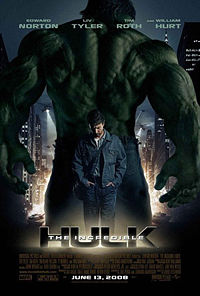 For weeks now there has been a lot of negative buzz surrounding the new film version of The Incredible Hulk, which stars Edward Norton as Bruce Banner.
For weeks now there has been a lot of negative buzz surrounding the new film version of The Incredible Hulk, which stars Edward Norton as Bruce Banner.
A few days ago the New York Times reported that:
Mr. Norton and Marvel, which has the right of final approval on the film, have sparred in recent weeks over trims, among other issues, said studio executives involved, who asked to remain anonymous as they were not authorized to speak publicly.
Mr. Norton — who was hired to rewrite the script along with playing the lead — has made it clear he won’t cooperate with publicity plans if he’s not happy with the final product, these people said.
A spokeswoman for Mr. Norton said he had no comment. Mr. Maisel brushed off the friction as par for the course.
But now Norton has responded with a statement to Entertainment Weekly:
“Like so many people I’ve loved the story of The Hulk since I was a kid, so it was thrilling when Marvel asked me to write and help produce an altogether new screen incarnation, as well as play Bruce Banner.
I grew up reading Marvel Comics and always loved the mythic dimension and contemporary themes in the stories, and I’m proud of the script I wrote.
In every phase of production, including the editing, working with Louis Leterrier has been wonderful…I’ve never had a better partner, and the collaboration with all the rest of the creative team has been terrific.
Every good movie gets forged through collaboration, and different ideas among people who are all committed and respect the validity of each other’s opinions is the heart of filmmaking.
Regrettably, our healthy process, which is and should be a private matter, was misrepresented publicly as a ‘dispute,’ seized on by people looking for a good story, and has been distorted to such a degree that it risks distracting from the film itself, which Marvel, Universal and I refuse to let happen.
It has always been my firm conviction that films should speak for themselves and that knowing too much about how they are made diminishes the magic of watching them.
All of us believe The Incredible Hulk will excite old fans and create new ones and be a huge hit…our focus has always been to deliver the Hulk that people have been waiting for and keep the worldwide love affair with the big green guy going strong.”
All this chatter about the film doesn’t bode well but it goes without saying that no-one should judge it until actually seeing the finished cut.
But the reality is that we now live in an age where summer blockbusters depend on long lead buzz (e.g. Superbowl spots, early footage) and making and releasing a high profile film like this can’t really be done quietly.
The other problem is that The Hulk is possibly the hardest Marvel character to get right. If you are being faithful to the comics you have to make him a large creature, but that doesn’t always translate well to the screen.
The 2003 version never really grappled with this problem. Although it had some good ideas (e.g. the split screen comic effects and the darker tone) it didn’t make Bruce Banner and the Hulk seem part of the same being.
Watching the trailer for this new film, it is a little worrying that they appear to have created a slightly darker version of the last Hulk. Plus, it also seems like Abomination (his nemesis in the film) is a bit too similar.
Maybe Universal should have waited a few more years (like Warner Bros did with the Batman franchise) before someone had a genuinely original way of rebooting the character.
But we shall see.
> Trailer for The Incredible Hulk
> Find out more about the Hulk character at WIkipedia
This Onion News piece on Iron Man is so well done it could almost pass for a real US news report:
Wildly Popular ‘Iron Man’ Trailer To Be Adapted Into Full-Length Film
N.B. Notice the strapline at about 2.02 which says “Yahoo tries to find ways to compete with Google by Googling ‘ways to compete with Google’ “
You may have seen his cinematic masterpiece Citizen Kane, marvelled at him in The Third Man, or heard outtakes from that infamous peas commercial but there was no doubt Orson Welles was a fascinating talker.
Check out this interview with Dick Cavett from July 1970, where Welles turns the tables on his host:
He also talks about Jerry Lewis and being directed by other people (such as Mike Nichols in Catch-22):
and how Winston Churchill helped Welles finance a film:
Plus, they finish by pondering whether a work of pornography can be a masterpiece and what his desert island movie is:
Silent Light is a hypnotic and beautifully crafted tale of forbidden love, set amongst the Mennonite community in Northern Mexico.
When I was in Cannes last year – about to see a film involving Nazi Vampires, believe it or not – I met a publicist who was working on the ‘new film from Carlos Reygadas‘.
On the train back to the hotel that night I noticed the review in Variety and was intrigued, although I wasn’t a huge fan of his previous film, Battle in Heaven.
However, when I finally got round to seeing Silent Light in October I was hugely impressed by both the technique and mood Reygadas created.
The story involves a married man named Johan who defies the laws of his religious community by falling in love with another woman.
It then explores the impact this has on him, his family and the wider community.
Although, the slow pace and esoteric feel won’t be for everyone, there is a rich sense of mystery to the world of the film.
The phrase ‘dream-like’ is often used in the wrong context but here it genuinely applies as Reygadas shows us a world that exists but seems so strange and distant – like the Amish, the Mennonites live by a strict code that eschews many aspects of modern life.
Using a cast of non-actors adds to this effect and if you give yourself up to the film, which is the polar opposite of how many mainstream films work in terms of narrative and editing, then you may find yourself basking in it’s otherworldliness.
Perhaps in years to come it will be best remembered for its incredible opening and closing shots, which are a feast for the senses.
The extras on the DVD include:
Sadly there is no commentary from the director by you can listen to an interview we did with him here back in October at the London Film Festival:
[audio:https://www.filmdetail.com/podcast/get.php?fla=podcast-2007-10-24-65220.mp3]Silent Light is out now on DVD from Tartan
> Buy Silent Light on DVD from Amazon UK
> Download our interview with Carlos Reygadas as an MP3
> The official website for Silent Light
> Carlos Reygadas at the IMDb
> Manohla Dargis of the NY Times with her review of the film at Cannes
> Karina Longworth of Spout gives her take on the film
> Find out more about the Mennonites at Wikipedia
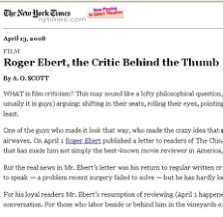 In an otherwise heartfelt and thoughtful tribute to Roger Ebert, who recently announced he is officially retiring from his TV show, A.O. Scott of the New York Times ponders the state of film criticism:
In an otherwise heartfelt and thoughtful tribute to Roger Ebert, who recently announced he is officially retiring from his TV show, A.O. Scott of the New York Times ponders the state of film criticism:
…if the future looked grim back in 1990 — when Entertainment Weekly’s letter grades and the proliferation of Siskel and Ebert knockoffs seemed to threaten the integrity of the critical enterprise — what must it look like now that the Internet is gobbling up all discourse?
Is the Internet really ‘gobbling up discourse?’ This sounds like a case of someone in a big media Ivory Tower imagining a horde of digital barbarians at his gate.
But – as I’ve argued before – surely the Internet is actaully enabling discourse?
He goes on:
If a star- or thumb-based rating system was the enemy of nuance and complex thought, what are we to make of the splattered fruit at rottentomatoes.com or the numerical averages at metacritic.com?
Are review aggregators like Rotten Tomatoes and Metacritic a bad thing? Clearly it is stupid to merely reduce a film’s quality to a percentage or grade, but the benefit of these sites is that they introduce you to new writers and give you a greater awareness of the differences of opinion out there.
But wait, there is more:
If you spend time prowling the blogs, you may discover that the problem is not a shortage of criticism but a glut: an endless, sometimes bracing, sometimes vexing barrage of deep polemic, passionate analysis and fierce contention reflecting nearly every possible permutation of taste and sensibility.
Is this plurality of voices a worrying trend? It can make finding the good stuff harder, but do we really want a quasi-Soviet style system where a few big outlets set the ‘approved’ cultural agenda?
The use of the word ‘prowling’ (look up the definition) seems to imply that Tony was looking for bad blogs to justify his point.
But the real mistake here is not actually saying – or linking to – which ‘blogs’ he is referring to. It is as vague as saying you spend time reading ‘the newspapers’ or watching ‘the TV channels’.
Does he mean blogs like GreenCine Daily? Scanners? Hollywood Elsewhere? Spout Blog? Sergio Leone and the Infield Fly Rule? The Hot Blog? Matt Zoeller Seitz? In Contention? Thompson on Hollywood? All of these are intelligent places for the discussion of films and far from the ‘angry-amateur’ media stereotype of the faceless ‘blogger’.
The irony here of course is that Tony and his colleague Manohla Dargis are usually two of the best film writers you can read on the web. They happen to work for the New York Times, which admittedly gives them a huge platform both in tradional print and online, but I think both could find an audience and make their mark online even if they weren’t employed by the Gray Lady.
Unlike some doom merchants I am actually optimistic about the state of quality film writing – considered and intelligent pieces will spark discussion and stand out amongst the cacophony of snap judgements, ill considered rants and fanboy droolings that can proliferate on certain sites.
A further irony is Roger Ebert has long been one of the most web savvy of film critics, making his reviews available on the web and responding to his readers questions about interesting aspects of movies.
That engagement with his audience is another reason why he is so highly regarded by his peers and readers.
> Full A.O. Scott article at the NY Times
> Roger Ebert’s website
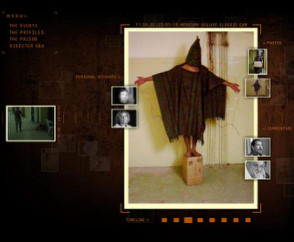 The website for Standard Operating Procedure is now live.
The website for Standard Operating Procedure is now live.
It is the new documentary from director Errol Morris and deals with the photographs taken during the Abu Ghraib prison scandal in Iraq.
The website for his last film – The Fog of War – won a Webby Award in 2004 and this one has a similar use of flash.
It also stresses the the importance of the actual photos as they are scattered all over the site.
As Morris says in the official Q&A:
It all starts with the photographs. They are at the core of this whole project.
270 photographs were given to the Army Criminal Investigation Division, and many of them appear in the movie.
Standard Operating Procedure is my attempt to tell the story behind these photographs, to examine the context in which they were taken.
People think they understand the photographs, that they are selfexplanatory.
They think they know what they are about – but do they, really? That’s the question.
Megan Ambuhl, one of the soldiers in the movie, asks: have we looked “outside the frame?” This film is an attempt to do that.
The film opens in the US on April 25th in limited release
> Official site for Standard Operating Procedure
> Participant site for the film
 Philip French has been the chief film critic at The Observer for over 30 years and has recently been awarded a BAFTA fellowship.
Philip French has been the chief film critic at The Observer for over 30 years and has recently been awarded a BAFTA fellowship.
The UK newspaper has compiled a nice set of features to honour one of their finest writers:
It is a fitting tribute and a model of how online content can supplement the print edition.
But it also highlights the reasons French remains the best UK film critic, which is his ability to write about films in engaging, fair and learned manner.
His fairness means that he takes mainstream films seriously (both the good and the bad) and doesn’t feel the need to come up with a contrarian angle in order to attract attention.
Whether he likes a film or not, I get the sense he gives anything he sees a fair crack of the whip. Unlike some of his contemporaries, he reviews all the weekly releases and doesn’t farm out lesser known films to a deputy.
His learning means that his can place films in a valuable context, be it historical, political or artistic, but he manages to do so in a way that avoids the snooty academic tone that can plague highbrow criticism.
He also reminds you that there is a world outside of films, which is useful in keeping things in perspective.
If you are a critic for a media outlet, you get invited to pre-release screenings and in the case of the national press, screenings usually take place every Monday or Tuesday.
Sometimes, a mood of jaded cynicism can pervade the air (particularly if the film is a stinker) but Philip is always a notable presence because he invariably stays until the credits have finished.
For me, it is symbolic of both his professionalism and genuine love of cinema. In the UK, too many people assigned to write about about films are arts journalists plucked from the social networks that pervade the British media.
Sometimes they appear to have little love or knowledge of the medium and favour witty putdowns over genuine thought.
In recent weeks a raft of US film critics have lost their jobs and the role has been called in to question. In a post I wrote on that very subject I said that the best critics must inform, enlighten and entertain.
French does all three and remains a shining example of what a good arts journalist should be.
> Read Philip’s latest reviews at The Observer
> Check out past articles at Guardian Unimited
(Photo: Richard Saker / The Observer)
J.K. Rowling and Warner Bros are suing the publishers of an ‘unauthorised’ Harry Potter dictionary called The Harry Potter Lexicon.
RDR Books of Michigan said the author of the Lexicon, Steve Vander Ark, based it on his fan website, which has been very popular with Potter fans.
According to Reuters, Rowling herself had called it “a great site”.
However, the author wants to write her own definitive Harry Potter encyclopedia and donate the proceeds to charity.
She says:
I cannot …approve of ‘companion books’ or ‘encyclopedias’ that seek to pre-empt my definitive Potter reference book for their authors’ own personal gain.
The losers in such a situation would be the charities that I hope, eventually, to benefit.
Nikke Finke of Deadline Hollywood Daily reports:
The company, which normally publishes books about travel and Judaica, will defend The Harry Potter Lexicon which began online and is about to become what it says is a “reference guide” which Rowling can’t lay claim to.
But issues of copyright infringement and fair use are in dispute over online material that’s been subsequently published.
…Rowling will be the first witness for the plaintiffs. “It’s very important to her,” an insider told me Friday night. “She doesn’t feel that somebody else should be effectively ripping off her work and infringing on her intellectual property.”
This case is set for bench trial (which means no jury) in the New York Federal District Court of Judge Robert Patterson on Monday.
RDR Books defence team includes people from the Fair Use Project at Stanford University Law School.
They argue:
In support of her position Ms. Rowling appears to claim a monopoly on the right to publish literary reference guides, and other non-academic research, relating to her own fiction.
This is a right no court has ever recognized. It has little to recommend it.
If accepted, it would dramatically extend the reach of copyright protection, and eliminate an entire genre of literary supplements: third party reference guides to fiction, which for centuries have helped readers better access, understand and enjoy literary works.
You can read their legal brief here, whilst Team Potter’s brief is here, along with a further reply here.
This is a tricky one – although Rowling and Warner Bros may indeed have a case, this could easily backfire.
Even if they win and protect the ‘Potter brand’, the danger is that they’ll look like they are punishing the fan culture that has helped make the books and films so popular.
Or are the Potter books too successful and ingrained in pop culture to be damaged by any fall out from this?
Leave your thoughts below.
> Reuters report on the case from last October
> Nikki Finke at DHD reports on the case
> The Fair Use Project at Stanford University Law School
> The Harry Potter Lexicon
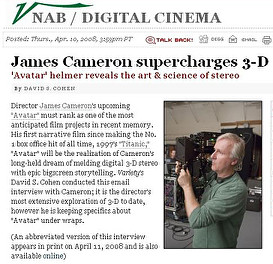 David S. Cohen of Variety has conducted a lengthy interview with James Cameron.
David S. Cohen of Variety has conducted a lengthy interview with James Cameron.
The director of The Terminator, Aliens, Titanic and the forthcoming Avatar talks about a number of different things related to making films in 3-D, including the power of scenes shot in the medium:
When you see a scene in 3-D, that sense of reality is supercharged. The visual cortex is being cued, at a subliminal but pervasive level, that what is being seen is real.
All the films I’ve done previously could absolutely have benefited from 3-D. So creatively, I see 3-D as a natural extension of my cinematic craft.
The renaissance of the new wave of 3-D films:
The new 3-D, this stereo renaissance, not only solves all the old problems of bad projection, eyestrain, etc., but it is being used on first-class movies that are on people’s must-see lists.
These are fundamental changes from what happened with the flash-in-the-pan 3-D craze of the ’50s. 3-D is also a chance to rewrite the rules, to raise ticket prices for a tangible reason, for demonstrable value-added.
The state of 3-D in the home video market:
The only limitation to having stereo viewing in the home is the number of titles currently available. When there is more product, the consumer electronics companies will make monitors and players.
The technology exists and is straightforward. Samsung has already shipped 2 million plasma widescreens which can decode an excellent stereo image. There’s just no player to hook up to it right now.
Filming his latest project in 3-D:
On “Avatar,” I have not consciously composed my shots differently for 3-D. I am just using the same style I always do.
In fact, after the first couple of weeks, I stopped looking at the shots in 3-D while I was working, even though the digital cameras allow real-time stereo viewing.
Check out the full interview here.
> James Cameron at the IMDb
> Find out more about 3-D filmmaking at Wikipedia
> Cameron fansite
Earlier this week I spoke to Jim Sturgess and Kate Bosworth who both star in 21, which opens in the UK today.
Based on the best selling book Bringing Down the House, the story is about a group of MIT students who use their math skills to count cards and win big in Las Vegas every weekend.
Listen to the interviews here:
[audio:http://filmdetail.receptionmedia.com/Jim_Sturgess_and_Kate_Bosworth_on_21.mp3]Download it as a podcast via iTunes by clicking here.
> Download this interview as an MP3 file
> Jim Sturgess and Kate Bosworth at the IMDb
> The Tech at MIT on the students who inspired the film
(Image courtesy of Sony Pictures © 2008)
This week we review Leatherheads, 21, Shine A Light and [Rec].
Listen to the reviews here:
[audio:https://www.filmdetail.com/podcast/get.php?fla=podcast-2008-04-11-75554.mp3]Download and subscribe to the review podcast via iTunes by clicking here.
> Download this review podcast as an MP3 file
> Get local show times for your area via Google Movies
> Check out other reviews for these films at Metacritic
> Listen to our interview with Kevin Spacey on 21
 It has been a year since we started the FILMdetail podcasts.
It has been a year since we started the FILMdetail podcasts.
Many thanks to Matt Deegan for all his help in setting it up and the good folks at Loudblog and WordPress for providing the software that enables us to publish the audio on our site and through iTunes.
I would also like to thank Rendah Heywood for being the ‘voice’ that introduces each podcast and the folks at Roland for inventing the Edirol R-09 recorder, a brilliant device that has made my job a lot easier.
Plus, I must also give a shout out to the numerous publicists (too many to mention individually, but you know who you are) who helped set up the interviews and the many actors, directors, writers and producers who sat through my questions.
Below are links to all the interviews we have featured on the podcast since April 10th last year:
You can subscribe to our interview and review podcasts here via RSS or iTunes.
The photo sharing behemoth Flickr has introduced video to their site.
On their blog they announce the arrival of moving images, with the 90 second limit being the eye opener:
Video! Video! Video! The rumours are true and “soon” is now. We’re thrilled to introduce video on Flickr.
If you’re a pro member, you can now share videos up to 90 glorious seconds in your photostream.
90 seconds? While this might seem like an arbitrary limit, we thought long and hard about how video would complement the flickrverse.
If you’ve memorized the Community Guidelines, you know that Flickr is all about sharing photos that you yourself have taken.
Video will be no different and so what quickly bubbled up was the idea of “long photos,” of capturing slices of life to share.
This is an example of a video:
> Check out the Flickr blog for more announcements
> TechCrunch announcing the arrival of Flickr video